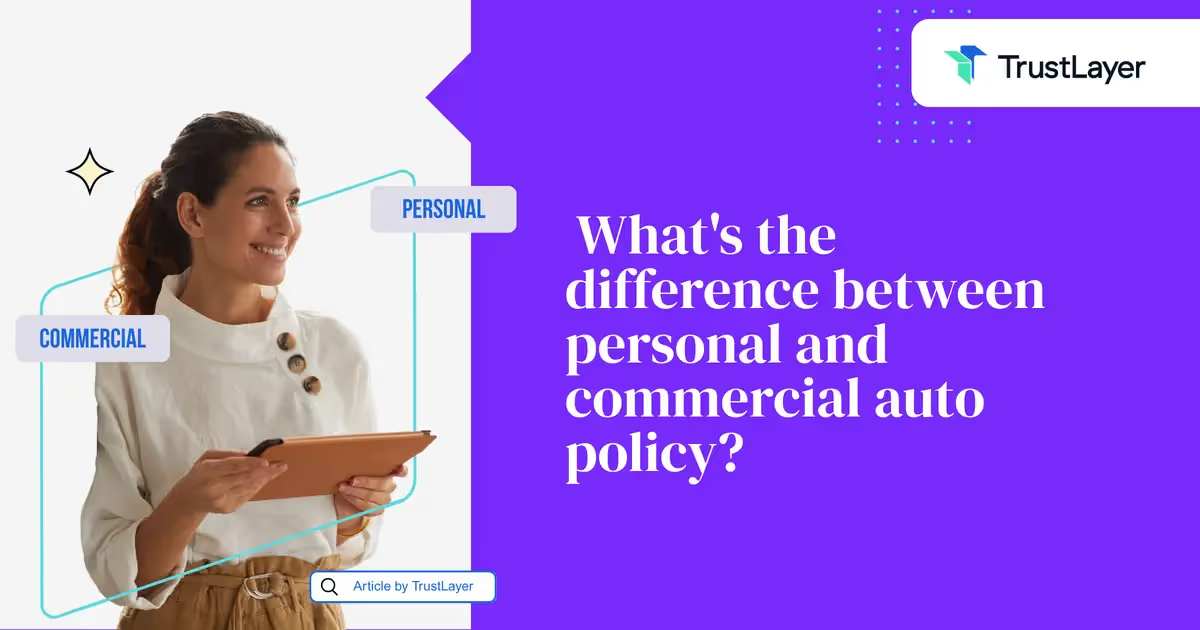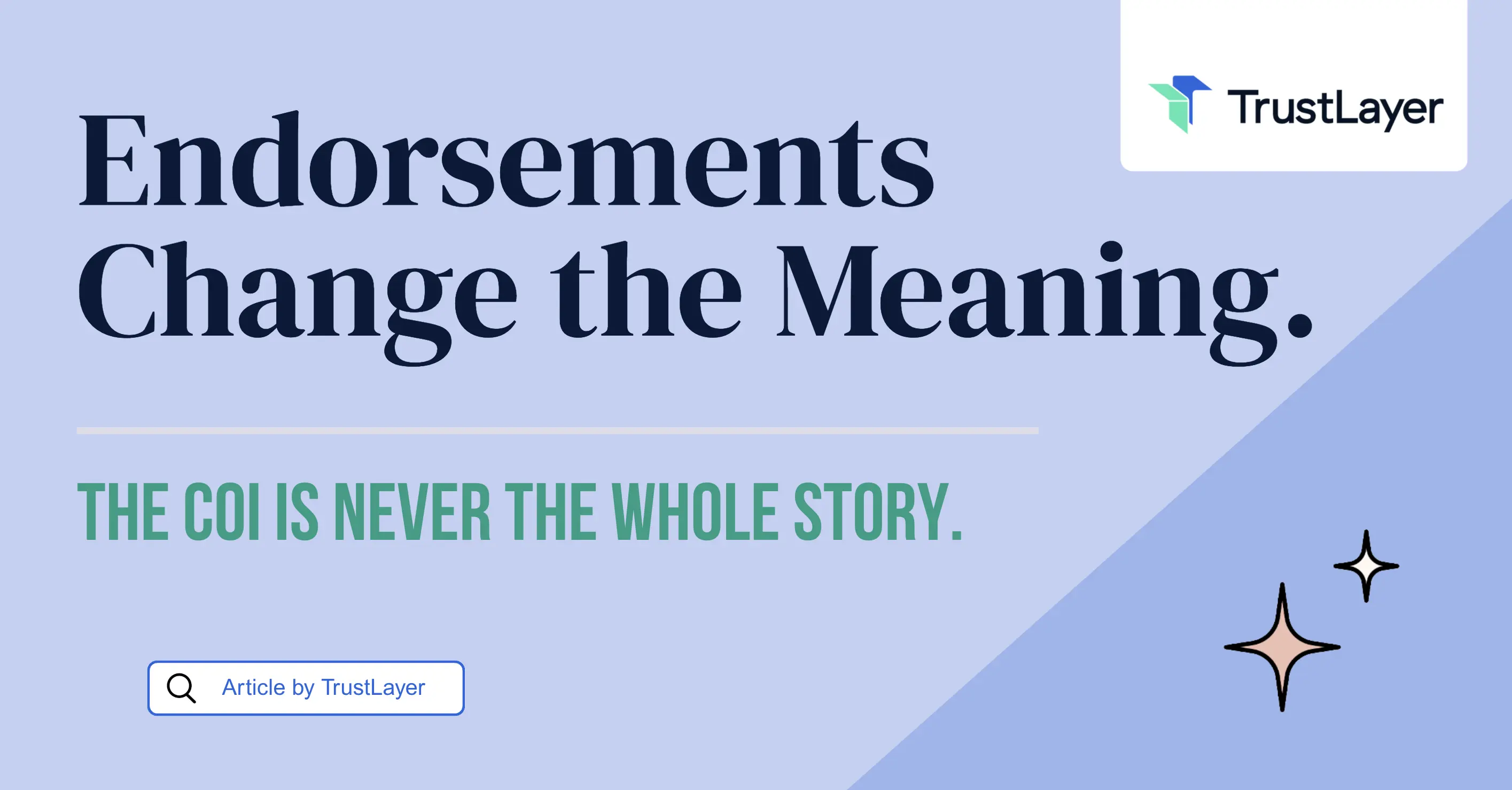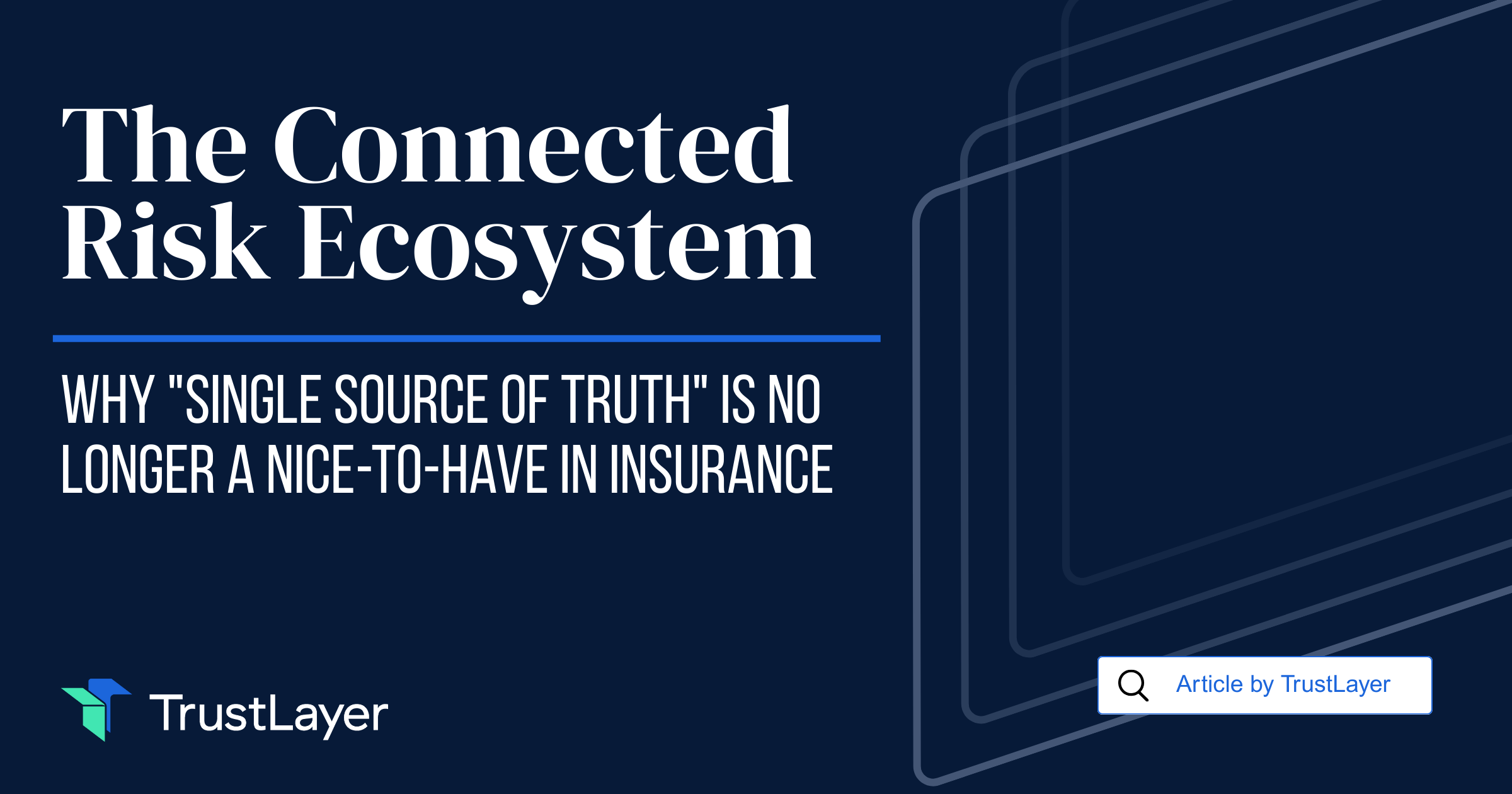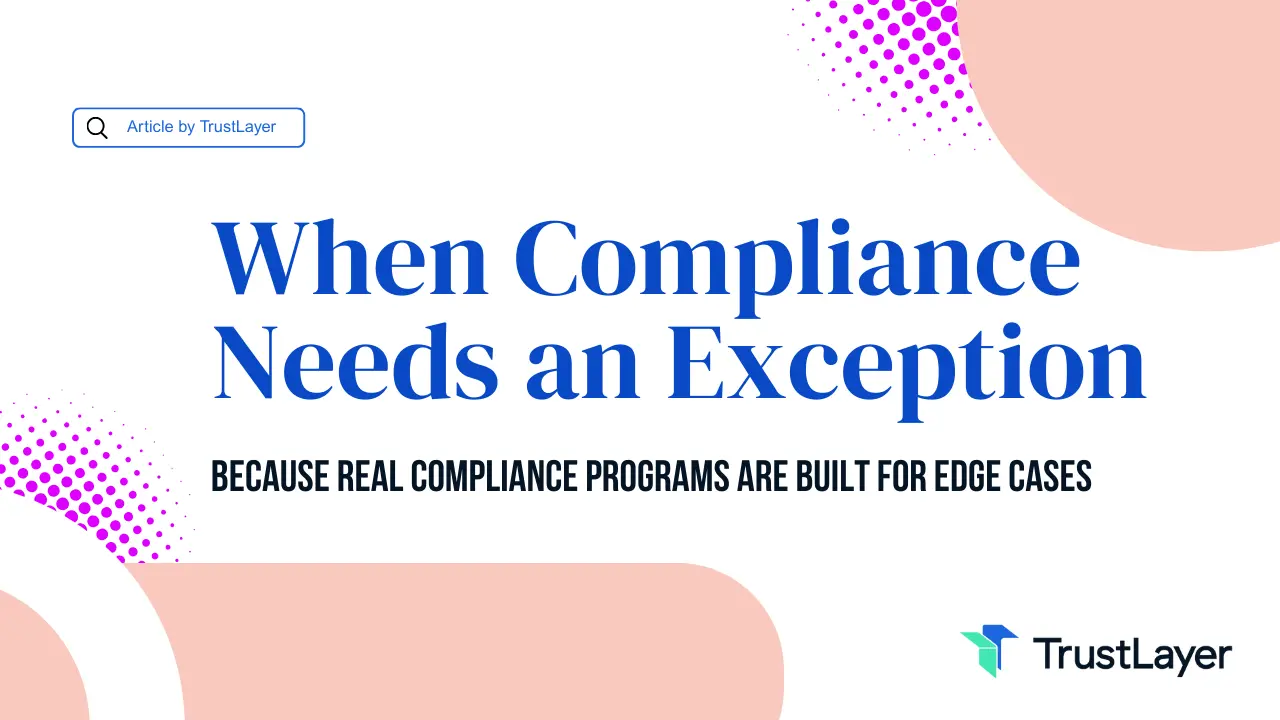What's the difference between personal and commercial auto policy?

Understanding the nuances between personal and commercial auto policies is crucial for anyone who drives a vehicle, whether for personal use or business purposes. While both types of insurance serve the fundamental purpose of providing coverage in the event of an accident, they cater to different needs and scenarios. This article explores the key differences between these two types of auto insurance, enabling you to make informed decisions tailored to your specific needs.
Defining Personal Auto Policies
A personal auto policy is designed for individuals who use their vehicles primarily for personal, non-commercial purposes. This type of insurance typically covers personal vehicles, such as cars and motorcycles, and sometimes also includes recreational vehicles. The coverage is tailored to protect the driver and passengers in case of accidents, theft, or damage caused by natural disasters. Understanding the nuances of these policies can empower drivers to make informed decisions about their coverage options, ensuring they have the necessary protection while on the road.
Key Features of Personal Auto Policies
Personal auto policies typically include a range of coverage options, such as liability, collision, comprehensive, and uninsured/underinsured motorist coverage. Liability coverage is the most critical component, as it protects the policyholder against claims for bodily injury and property damage caused to others in the event of an accident. This coverage is essential not only for legal compliance in most states but also for safeguarding one's financial future, as lawsuits can arise from even minor accidents.
Collision coverage helps pay for damage to the policyholder's vehicle resulting from a collision with another vehicle or object. In contrast, comprehensive coverage addresses damages from non-collision incidents, such as theft or natural disasters. Additionally, personal auto policies often provide coverage for medical expenses incurred by the policyholder and passengers in the event of an accident. Some policies may also offer additional features, such as roadside assistance and rental car reimbursement, which can be invaluable during unexpected breakdowns or accidents, ensuring that drivers are not left stranded or inconvenienced.
Who Needs a Personal Auto Policy?
Individuals who primarily use their vehicles for commuting to work, running errands, or leisure activities typically require a personal auto policy. If the vehicle is not used for business purposes, this type of insurance is the most cost-effective and straightforward option. Additionally, personal auto policies can often be bundled with other types of insurance, such as homeowners' or renters' insurance, to achieve further savings. This bundling not only simplifies the management of insurance policies but can also lead to significant discounts, making it a financially savvy choice for many households.
Moreover, even those who infrequently drive or own older vehicles can benefit from a personal auto policy. While it might seem unnecessary for occasional drivers, having insurance in place protects against unforeseen events, such as theft or damage from a storm. Furthermore, many states have minimum coverage requirements, making it essential for all vehicle owners to consider a personal auto policy to remain compliant and protect their assets effectively.
Understanding Commercial Auto Policies
In contrast, a commercial auto policy is specifically designed for businesses that use vehicles as part of their operations. This can include delivery services, rideshare companies, construction businesses, and any other scenario where vehicles are used for business purposes. Commercial auto policies offer coverage tailored to the unique risks associated with operating vehicles for business purposes.
Key Features of Commercial Auto Policies
Commercial auto policies typically offer broader coverage options than personal auto policies. They often include liability coverage, but may also provide additional protections such as hired and non-owned auto coverage, which protects businesses that use vehicles not owned by them. This is particularly important for companies that rely on employee-owned vehicles for business activities.
Furthermore, commercial policies can cover multiple vehicles under a single policy, making it easier for businesses to manage their insurance needs. They may also offer specialized coverage for equipment and cargo transported in the vehicle, which is essential for businesses that transport goods or tools. For instance, a construction company might need coverage for expensive machinery being transported to job sites. At the same time, a delivery service may require protection for perishable goods that could be damaged in transit.
Who Needs a Commercial Auto Policy?
Businesses of all sizes that utilize vehicles for their operations should consider a commercial auto policy. This includes companies that have a fleet of cars, as well as those that occasionally use personal vehicles for business purposes. Without the appropriate coverage, businesses may face significant financial risks in the event of an accident or damage to a vehicle used for work purposes.
Moreover, industries such as logistics, transportation, and even real estate often find themselves at a higher risk due to the nature of their operations. For example, a real estate agent who frequently drives clients around to show properties may inadvertently expose themselves to liability if an accident were to occur. In such cases, having a commercial auto policy can provide peace of mind, ensuring that both the agent and their clients are protected while conducting business. Additionally, companies that engage in interstate travel or operate in multiple states may also need to consider the varying regulations and requirements for commercial auto insurance, which can further complicate their insurance needs.
Comparing Coverage Options
When comparing personal and commercial auto policies, it’s essential to understand the differences in coverage options and limits. While both policies provide liability coverage, the limits and exclusions can vary significantly.
Liability Coverage Differences
Liability coverage is a fundamental component of both personal and commercial auto policies. However, commercial policies often have higher liability limits to accommodate the increased risks associated with business operations. For instance, a delivery service may face higher liability exposure than a personal driver, necessitating greater coverage limits.
Additionally, commercial policies may include endorsements that provide coverage for specific business-related risks, such as transporting goods or carrying passengers for hire. These endorsements are crucial for businesses to ensure they are adequately protected against potential claims. For example, a contractor using a vehicle to transport tools and equipment may require specialized coverage that a personal auto policy would not provide, highlighting the importance of tailored insurance solutions for business needs.
Exclusions and Limitations
Personal auto policies typically have exclusions for business use, meaning that if an individual vehicle is involved in an accident while being used for business purposes, the policy may not cover the damages. This is a critical distinction that business owners must be aware of when evaluating their insurance needs.
On the other hand, commercial auto policies are designed to cover vehicles used for business purposes, but they often have exclusions related to personal use. Understanding these limitations is vital for ensuring that the correct type of coverage is in place. For instance, if an employee uses a company vehicle for personal errands, the policy may not extend to cover any accidents that occur during that time. This underscores the necessity for businesses to implement clear policies regarding vehicle use and to communicate these guidelines effectively to their employees, thereby avoiding potential gaps in coverage.
Moreover, the nature of the business can significantly influence the type of coverage required. For example, a rideshare driver may need additional coverage for passenger liability, while a construction company might prioritize coverage for equipment damage during transport. Each business's unique operational risks should be carefully assessed to determine the most appropriate insurance strategy, ensuring that both personal and commercial needs are adequately met.
Cost Considerations
The cost of auto insurance can vary significantly between personal and commercial policies. Generally, commercial auto policies tend to be more expensive due to the increased risks associated with business operations. Factors such as the type of business, the number of vehicles, and the driving records of employees can all influence the cost of coverage. For instance, a delivery service with a fleet of vans will face different risk assessments and premium calculations compared to a small landscaping business that uses only a couple of trucks. Understanding these nuances is crucial for business owners when budgeting for insurance expenses.
Factors Affecting Premiums
Several factors impact the premiums for both personal and commercial auto policies. For personal auto insurance, factors such as the driver’s age, driving history, and the type of vehicle can affect rates. In contrast, commercial auto insurance premiums are influenced by the nature of the business, the types of vehicles used, and the driving records of all employees operating those vehicles. For example, a construction company that frequently transports heavy equipment may incur higher premiums due to the increased likelihood of accidents compared to a consulting firm that uses standard sedans. Additionally, the size of the business can also play a significant role; larger fleets might benefit from economies of scale, potentially lowering the per-vehicle insurance cost.
Businesses with a good safety record and lower claims history may qualify for discounts, while those with higher risks may face higher premiums. Additionally, the geographic location of the business can also influence insurance costs. Urban areas with higher traffic congestion and accident rates typically result in higher premiums compared to rural locations. Furthermore, local regulations and state-specific insurance requirements can also affect overall costs, making it essential for business owners to understand their regional insurance landscape.
Potential Savings and Discounts
Both personal and commercial auto policies may offer various discounts that can help reduce overall insurance costs. Personal auto policies often offer discounts for bundling multiple policies, maintaining a good driving record, or completing a defensive driving course. These savings can add up significantly, especially for families with multiple vehicles or drivers. Additionally, many insurers now offer usage-based insurance options, allowing drivers to save money based on their actual driving habits, which encourages safer driving practices.
Commercial auto policies may offer discounts for having safety programs in place, insuring multiple vehicles, or being a member of specific industry associations. For example, a trucking company that implements rigorous driver training and vehicle maintenance programs may not only enhance safety but also qualify for lower premiums. Businesses should explore all available options to maximize their savings on insurance premiums. Engaging with an insurance broker can provide valuable insights into the best coverage options and potential discounts tailored to specific business needs, ensuring that companies are not only compliant but also financially savvy in their insurance purchases.
Legal Implications and Requirements
Understanding the legal implications of personal and commercial auto policies is essential for compliance and protection. Different states have varying requirements for minimum liability coverage, and businesses must ensure they meet these legal obligations.
State Regulations
Most states require drivers to carry a minimum amount of liability insurance, regardless of whether the vehicle is used for personal or commercial purposes. However, the specific requirements can vary depending on the vehicle's intended use. Businesses may also need to comply with additional regulations, such as obtaining commercial vehicle registration and permits.
Failing to meet these requirements can result in penalties, fines, or even legal action in the event of an accident. Both individuals and businesses must familiarize themselves with their state’s insurance laws to ensure compliance.
Liability in Accidents
In the event of an accident, the liability coverage provided by personal and commercial auto policies can significantly impact the outcome. For personal auto policies, the coverage typically extends to the policyholder and any authorized drivers. However, if an individual vehicle is used for business purposes, the coverage may not apply, leaving the driver and the business exposed to potential liability.
Commercial auto policies, on the other hand, are designed to cover business-related incidents and accidents. This means that if an employee is driving a company vehicle and is involved in an accident, the business is generally protected under the commercial policy. Understanding these liability implications is crucial for both individuals and companies to ensure they have adequate coverage in place.
Choosing the Right Policy
Deciding between a personal and commercial auto policy requires careful consideration of how the vehicle will be used. Assessing the primary purpose of the car is the first step in determining the appropriate coverage.
Evaluating Your Needs
Individuals should assess their driving habits and determine how frequently they use their vehicles for personal versus business purposes. If the car is primarily used for personal activities, a personal auto policy is likely the best fit. However, if the vehicle is used for work-related tasks, consider a commercial policy.
Businesses should conduct a thorough assessment of their vehicle usage, including the number of vehicles, the types of operations conducted, and the driving records of employees. This evaluation will help identify the specific coverage needs and ensure that the right policy is selected.
Consulting with Insurance Professionals
Consulting with an insurance professional can provide valuable insights into the best coverage options for personal and commercial auto policies. These experts can help navigate the complexities of insurance, ensuring that individuals and businesses understand their options and make informed decisions.
Insurance agents can also assist in comparing quotes from different providers, helping to identify the most cost-effective solutions tailored to specific needs. This personalized approach can lead to improved coverage and potential premium savings.
Conclusion
Understanding the differences between personal and commercial auto policies is essential for ensuring adequate protection and compliance with legal requirements. While personal auto policies cater to individual drivers using their vehicles for personal purposes, commercial auto policies are designed for businesses that rely on cars as part of their operations.
By evaluating individual or business needs, considering coverage options, and consulting with insurance professionals, drivers can make informed decisions about the type of auto insurance that best suits their needs. Having the appropriate coverage in place can provide peace of mind and financial security in the event of an accident or unexpected incident.
As you consider the right auto insurance policy for your personal or business needs, remember that managing risk extends beyond just selecting a policy. TrustLayer revolutionizes the way modern risk managers handle certificates of insurance (COIs), streamlining the verification process and reducing administrative burdens. Embrace the future of risk management by automating the collection, storage, and validation of your compliance documents with TrustLayer, the leading solution built in collaboration with industry experts. Don't let outdated processes hold you back. Schedule a time to speak with our team and learn how TrustLayer can enhance your approach to insurance tracking and vendor document management.
















